Archive for the ‘Munich Times’ Category
Wednesday, April 4th, 2018
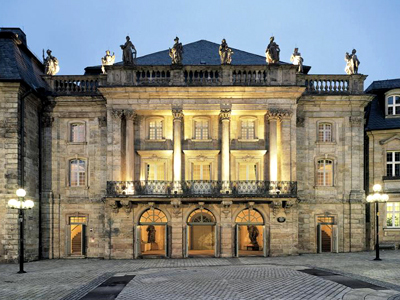
By ANDREW POWELL
Published: April 4, 2018
MUNICH — Bayreuth’s Rococo gem of a theater, the Markgräfliches Opernhaus, will reopen April 12 after a five-year, €32-million restoration. On the bill, fittingly: Hasse’s Artaserse (1730), as mounted by the Theater-Akademie August Everding.
Like virtually every public project in Germany these days, the effort took longer than expected and went over budget. Little or no funding came as a result of the building’s 2012 inscription as a UNESCO World Heritage “property” just before work began, leaving Bavarian taxpayers to foot essentially the whole tab.
Carlo Galli Bibiena created his sumptuous interior entirely in wood, with canvas, under the remote eye of his famous father Giuseppe. It sits within an urbane masonry shell by architect Joseph Saint-Pierre, all on orders from Wilhelmine of Prussia. The doors first opened in 1748 for stagings of Jommelli’s Ezio and the Hasse opera. Two years later, Saint-Pierre finished his façade.
The restorers progressed meticulously, from the ceiling down through the loges. Their mantra: “as bright and colorful as [when new].” Stage and proscenium have been remade in their 18th-century form, reversing Nazi-era structural changes. 4,500 bricks have been replaced.
Michael Hofstetter will conduct Artaserse, which transfers in May to the Theater-Akademie’s home here. Next Thursday’s premiere and attendant festivities will video-stream starting at 12:30 p.m. EDT at www.br.de [slash] franken. A tight-squeeze matinee concert May 1 by the Berlin Philharmonic, paying tribute to the Wagner town with the Wesendonck-Lieder, plus Beethoven, will likewise show online: 5 a.m. EDT at www.br-klassik.de [slash] concert.
Photo © Bayerische Schlösserverwaltung
Related posts:
St John Passion Streams
Bayreuth Parsifal Due Online
Time for Schwetzingen
Ministry Split, Minister Fired
Concert Hall Design Chosen
Tags:Artaserse, Bayreuth, Carlo Galli Bibiena, Hasse, Joseph Saint-Pierre, Margravial Opera House, Markgräfliches Opernhaus, Michael Hofstetter, News, Theater-Akademie August Everding, Wilhelmine of Prussia
Posted in Munich Times | Comments Closed
Wednesday, March 21st, 2018
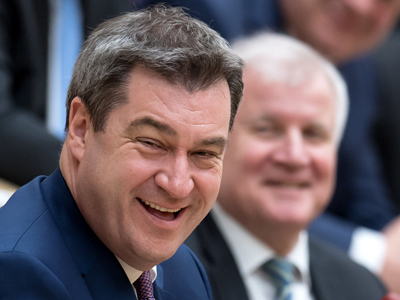
By ANDREW POWELL
Published: March 21, 2018
MUNICH — Bavaria’s Culture Ministry, responsible for Bayerische Staatsoper and Staatstheater am Gärtnerplatz, among many other entities, underwent a sudden double shake-up this morning with the firing of its cheerful chief, Ludwig Spaenle, and an organizational severing into two parts.
Bernd Sibler, 47, is the new Kultusminister. The former Bayerisches Staatsministerium für Bildung und Kultus, Wissenschaft und Kunst (Bavarian State Ministry of Education and Culture, Science and Art) is now two ministries, divided at that comma for the third time in its history. In a more subtle change, the word Bildung (learning) has been replaced with the sterner term Unterricht (instruction).
The shake-up came at the behest of Bavaria’s forceful new Minister-Präsident, Markus Söder, 51, who replaced Horst Seehofer when the latter joined Angela Merkel’s cabinet in Berlin last week as Federal Minister of the Interior. (The two are pictured.) Merkel and Seehofer, who differ on the sore topic of immigration, belong to the CDU party and its Bavarian ally, the CSU, respectively. Söder and Sibler are CSU members.
It is unclear what moves Söder, through Sibler, will make on Bavaria’s lavish arts budgets. He has been Seehofer’s Finanzminister these last seven years, and known as a fiscal hawk not much connected to the classical music scene.
Bavarian King Ludwig I established the Culture Ministry in 1847, soon broadening it to embrace “all aspects of upbringing, instruction, morals, spiritual and artistic learning, and the institutions for them.” It became a state body in 1918, when the monarchy fell; a purveyor of Nazi ideology in schools and universities, art and culture, in 1933; and a champion of freedom, rule of law, and democracy after the Second World War.
Minister-Präsident Franz Josef Strauß in 1986 was the first to divide the ministry, on the pattern now mimicked by Söder. It was reunited in 1990, divided again eight years later, and reunited in 2013. Its spiritual mandate never disappeared: Kultus means worship, or adoration, as well as culture.
Photo © Deutsche Presse-Agentur
Related posts:
Candidate Nelsons?
Bumps and Bychkov at MPhil
Concert Hall Design Chosen
MPhil: €24,200 for Refugees
State Mute on Ticket Handicap
Tags:Angela Merkel, Bavarian State Opera, Bayerische Staatsoper, Bernd Sibler, CDU, CSU, Franz Josef Strauß, Horst Seehofer, King Ludwig I, Ludwig Spaenle, Markus Söder, News, Staatstheater am Gärtnerplatz
Posted in Munich Times | Comments Closed
Tuesday, March 20th, 2018
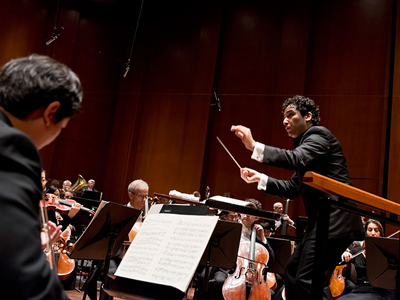
By ANDREW POWELL
Published: March 20, 2018
MUNICH — Judging from reports around the country here, the Houston Symphony Orchestra today returns to Texas mission-accomplished. The clarity of its tone colors, the exuberance of its brass section, the articulate luster of its strings — all have been remarked upon during an eleven-day tour to busy German cities (plus Brussels, Vienna and Warsaw) already awash in art music. Last night’s concert in the Gasteig certified the plaudits, although the advance acclaim had not filled every seat. Stronger programming might have helped. Music director Andrés Orozco Estrada opened with the so-called Overture to West Side Story (1956), “a compilation of tunes not made by [Bernstein]” (Jack Gottlieb), when he could have chosen the work’s tense and authentic Prologue and thrown a cleverer light on his musicians. A heavily pregnant Hilary Hahn then meandered in good taste and with pure intonation through the same composer’s conceited Serenade after Plato’s Symposium (1954), unable to do much about its weak structure but sensitively supported by harpist Megan Conley and six astute percussionists. Dvořák’s D-Minor Seventh Symphony (1885) received a brilliantly flowing, sunny performance, with smooth work from the Houston horns and much soft, detailed playing. The Vienna-based, Colombian-Austrian maestro, who learned music at a school next to the rainforest east of Medellín, and first conducted there, will be with the 105-year-old HSO until at least 2022. An ideal appointment, on the evidence.
Photo © Anthony Rathbun
Related posts:
Flitting Thru Prokofiev
Nazi Document Center Opens
Concert Price Check
Pintscher Conducts New Music
Season of Concessions
Tags:Andrés Orozco Estrada, Bernstein, Gasteig, Hilary Hahn, Houston Symphony Orchestra, Kritik, Megan Conley, München, MünchenMusik, Munich, Review, Serenade, West Side Story
Posted in Munich Times | Comments Closed
Tuesday, March 6th, 2018

By ANDREW POWELL
Published: March 6, 2018
MUNICH — The rumor emerged last fall, lingered, and today became fact during a Free State of Bavaria cabinet meeting: Serge Dorny, 56, and Vladimir Jurowski, 45, will in Sept. 2021 take over as Intendant and Generalmusikdirektor, respectively, at Bavarian State Opera. So said a statement from Bavaria’s Kultusminister Ludwig Spaenle, listing the appointments in that sequence. No contract term was disclosed, and no salary. The opera company will go without a GMD in the preceding season, after incumbent Kirill Petrenko steps down.
Lyon-based Dorny and Berlin-based Jurowski have been colleagues before, if not salaried together, notably by way of the London Philharmonic and the Glyndebourne Festival. Presumably they will get along, as have Petrenko and outgoing Intendant Nikolaus Bachler. Bavaria’s Culture Ministry did not answer questions about the joint nature of the new hiring.
Dorny drew attention around Germany when in 2014 he sued Dresden’s Semperoper for wrongful termination. He had been appointed Intendant of that company for five years, to start that fall, but was peremptorily fired in February, midway through an agreed preparative season, and suffered the further indignity of a Saxon minister’s televised description that he had behaved “like the Sun King.” He won the case, and pay and damages to the tune of a reported €1.5 million, and in July 2016 fended off the Free State of Saxony’s appeal.
Dorny grew up in a Flemish-speaking family on western Belgium’s French border. He began his career in 1983 as a dramaturge working for Gerard Mortier at the Théâtre Royal de la Monnaie. Four years later he was heading the Festival van Vlaanderen. From 1996 to 2003 he served as chief executive and artistic director of the London Philharmonic, a post that took him yearly to Glyndebourne, before he started in his present, acclaimed role as directeur général of the Opéra de Lyon.
The Moscow-born conductor, whose family emigrated to Germany in 1990, promises high standards and a slightly freer approach to music direction than Petrenko. His theater work has centered on projects at Glyndebourne, where between 2003 and 2013 he filmed operas by all three of BStO’s so-called “house gods”: Mozart, Wagner and Strauss.
Janowski debuted with BStO in Nov. 2015 leading an adrenaline-charged Akademiekonzert program of Liszt, Hindemith and Prokofiev, and weeks later presided over a musically and dramatically successful new Ognenny angel (Огненный ангел). Although he did return for one performance of that opera the next summer, he has not appeared with the company since.
Andris Nelsons’ name was also floated for the GMD position. He moved to Munich in 2015 and had seemingly been interested in vitalizing the thinnish opera side of his career at Germany’s biggest opera company. However, as Munich’s Merkur newspaper has reported, his schedule was deemed too full to take on all the GMD duties — a fair assessment but one that could equally apply to Jurowski, who today heads orchestras* in London, Berlin and Moscow. Four performances of Rusalka last June have been Nelsons’ only BStO assignment.
[*He is concurrently principal conductor of the London Philharmonic, chief conductor and artistic director of the Rundfunk-Sinfonie-Orchester Berlin and artistic director of the State Academic Symphony Orchestra of Russia (in Moscow, formerly the USSR State Symphony Orchestra) … as well as principal artist of the Orchestra of the Age of Enlightenment, in London, and artistic director of the George Enescu Festival, in Bucharest.]
Photo © Simon Pauly
Related posts:
Candidate Nelsons?
Berlin’s Dark Horse
MPhil Bosses Want Continuity
Die Fledermaus Returns
All Eyes On the Maestro
Tags:Andris Nelsons, Bavarian State Opera, Bayerische Staatsoper, Ludwig Spaenle, München, Munich, News, Semperoper, Serge Dorny, Vladimir Jurowski
Posted in Munich Times | Comments Closed
Tuesday, February 27th, 2018
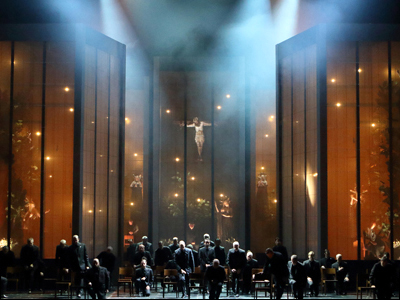
By ANDREW POWELL
Published: February 27, 2018
MUNICH — Sometimes the revival has the better cast. So it was for La Favorite at Bavarian State Opera on Sunday, when Giacomo Sagripanti, Clémentine Margaine and Ludovic Tézier made more sense of the music than their counterparts in the 2016 production’s first run (a Deutsche Grammophon DVD) — conductor Sagripanti instilling new urgency and sweep, Margaine singing magnificently as Léonor, Tézier’s Alphonse resonant and incisive. Matthew Polenzani and Mika Kares reprised their monastic duties as Fernand and Balthazar, Kares with impressive control of line. Much applause. It was, though, a night to listen rather than look because Amélie Niermeyer’s morally confused, for-the-camera staging serves neither the historical characters nor Donizetti’s.
Photo © Wilfried Hösl
Related posts:
Voix and Cav
Plácido Premium
All Eyes On the Maestro
Candidate Nelsons?
Die Fledermaus Returns
Tags:Amélie Niermeyer, Bavarian State Opera, Bayerische Staatsoper, Clémentine Margaine, Deutsche Grammophon, DVD, Gaetano Donizetti, Giacomo Sagripanti, Kritik, Matthew Polenzani, Mika Kares, München, Munich, Review, Tézier
Posted in Munich Times | Comments Closed
Wednesday, February 21st, 2018
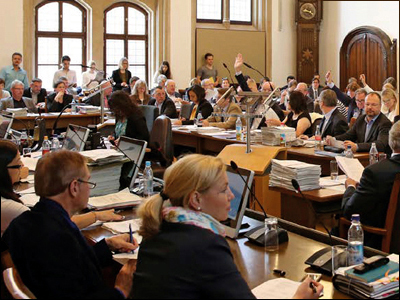
By ANDREW POWELL
Published: February 21, 2018
MUNICH — Putting box-office steadiness ahead of artistic achievement, the city council here voted this morning to extend by five years Valery Gergiev’s contract as Chefdirigent of the civically run Munich Philharmonic, as requested by the orchestra’s managers. The move doubles the Russian’s tenure, to encompass the seasons 2020–25. No salary was disclosed, as usual, but past reports have shown €800,000 as an annual figure.
Matthias Ambrosius, spokesman for the musicians, and clarinetist, noted in writing that the “vast majority” of MPhil players had wanted to lengthen the collaboration with Gergiev. Nonetheless it is widely understood that the managers’ request stemmed from a desire to ease dislocation of the orchestra in 2020, when a massive project to reconfigure its Gasteig home begins. Gergiev will in this sense be doing the city a favor, gamely cooperating for seasons at a temporary concert hall.
Photo © Landeshauptstadt München
Related posts:
MPhil Bosses Want Continuity
Bruckner’s First, Twice
Flitting Thru Prokofiev
Netrebko, Barcellona in Aida
Honeck Honors Strauss
Tags:Commentary, Gasteig, München, Münchner Philharmoniker, Munich, Munich Philharmonic, News, Valery Gergiev
Posted in Munich Times | Comments Closed
Wednesday, January 31st, 2018
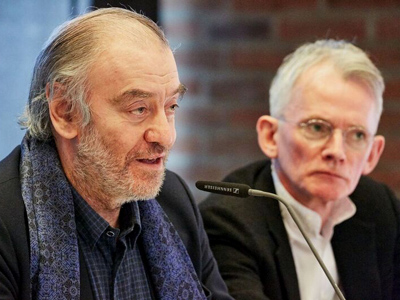
By ANDREW POWELL
Published: January 31, 2018
MUNICH — Contrary to a London blog report yesterday, nothing has been “locked down” with regard to a contract extension for Valery Gergiev at the Munich Philharmonic, though things are indeed moving in that direction, for practical more than artistic reasons.
What has happened is that Hans-Georg Küppers, Kulturreferent of the City of Munich, which operates the orchestra, has gone public with his resolve to recommend a full five-year renewal for the Russian maestro to the city council at its scheduled Feb. 21 meeting. Any contract-signing would naturally take place later.
Küppers, MPhil Intendant Paul Müller (pictured last year with Gergiev), and Munich Bürgermeister Dieter Reiter are all inclined on continuity because 2020, when the present contract expires, heralds the lengthy and probably tortuous closure of the MPhil’s Gasteig home for gutting — at which time the musicians must decamp for a temporary wooden hall next to a power plant up the Isar River.
Gergiev has been no more of a musical success here than anyone predicted, but the high tensions around his friendship with Vladimir Putin — at fever pitch in 2013 when he was hired — have abated, and artistic decision-making since he began his tenure 29 months ago has gone smoothly.
Regarding other jobs around town, rumors persist that Vladimir Jurowski has joined Andris Nelsons im Gespräch for Kirill Petrenko’s position as Generalmusikdirektor at Bavarian State Opera. Petrenko steps down in fall 2020 after an unprecedented single season as head both of Germany’s largest opera company and of the Berlin Philharmonic. No rumors are yet floating about a successor to, or a renewal for, Mariss Jansons, whose contract at the Bavarian Radio Symphony Orchestra is up one year after Gergiev’s.
Photo © Florian Emanuel Schwarz
Related posts:
MPhil Asserts Bruckner Legacy
Flitting Thru Prokofiev
Berlin’s Dark Horse
Gergiev, Munich’s Mistake
Horses for Mozartwoche
Tags:Andris Nelsons, Dieter Reiter, Gasteig, Hans-Georg Küppers, Kirill Petrenko, Mariss Jansons, München, Münchner Philharmoniker, Munich, Munich Philharmonic, News, Paul Müller, Valery Gergiev, Vladimir Jurowski, Vladimir Putin
Posted in Munich Times | Comments Closed
Friday, January 12th, 2018
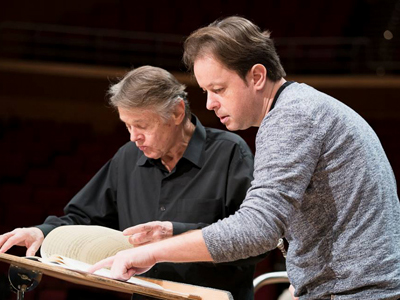
By ANDREW POWELL
Published: January 12, 2018
MUNICH — Against the medical odds, perhaps, Mariss Jansons turns seventy-five on Sunday, still adored by his favorite orchestra. Bavarian Broadcasting marks the occasion with a 44-minute video portrait, Im Zeichen der Musik, or In the Music’s Character, freely watchable. Last evening here at the Gasteig, a subscription concert of the Symphonie-Orchester des Bayerischen Rundfunks paraded contrasting sides of the musicians’ long union with Jansons, and everyone’s versatility. Martin Angerer navigated the elegant byways and tricky trills of Hummel’s Concerto a trombe principale (1803) with apparent ease in its original key of E, tidily accompanied. In an interview, the section principal distinguished this “godly” tonality from the “mundane” feel of E-flat, taken often in a convenience edition of the Hummel he deems a “stab in the heart,” but he stopped short of chancing the performance with the kind of Klappen-Trompete used originally, preferring the luxuries of a modern American piston instrument. (Soloist and conductor are pictured midweek.) Genia Kühmeier, Gerhild Romberger, Maximilian Schmitt and Luca Pisaroni made an impeccable quartet for the program’s main work, after the break, Beethoven’s C-Major Mass (1807), although the bass for some reason sang half-voice. The BR Chor glowingly intoned its lines yet struggled to focus the words in the acoustically poor venue. Jansons led supportively but as always from the ground up, never from the bowels of the Earth, and showing no inquirer’s zeal for the imaginative score. His clinical manner and the Bavarian players’ skill found their most persuasive outlet in an episodic exercise in chromatic unrest at the top of the evening: the Symphony in Three Movements (1945) of Stravinsky. Here, structure reigned, details sparkled, and the con moto third movement sounded (suitably) die-cast. It was in 2003 that this celebrated partnership began, since when the demanding and fussy but personable Latvian maestro’s contract has been renewed with accelerating commitment: for three years in 2013, and for three more years less than two years later — right after he sounded receptive to a theoretical, but as it turned out imagined, offer in Berlin. Which takes us up to 2021, past several happy birthday returns.
Photo © Bayerischer Rundfunk
Related posts:
Zimerman Plays Munich
Busy Week
MPhil Bosses Want Continuity
Manon, Let’s Go
Time for Schwetzingen
Tags:Bavarian Radio Symphony Orchestra, Bayerischer Rundfunk, Beethoven, BR, BR Chor, Chor des Bayerischen Rundfunks, Gasteig, Genia Kühmeier, Gerhild Romberger, Howard Arman, Hummel, Kritik, Luca Pisaroni, Mariss Jansons, Martin Angerer, Maximilian Schmitt, München, Munich, Review, Stravinsky, Symphonie-Orchester des Bayerischen Rundfunks, Symphony in Three Movements
Posted in Munich Times | Comments Closed
Thursday, December 28th, 2017
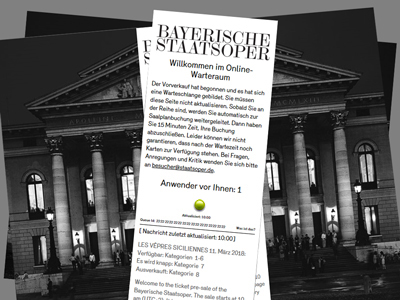
By ANDREW POWELL
Published: December 28, 2017
MUNICH — Post is under revision.
Illustration © Queue-it and Bayerische Staatsoper
Related posts:
Staatsoper Favors Local Fans
See-Through Lulu
Ettinger Drives Aida
U.S. Orchestras on Travel Ban
Time for Schwetzingen
Tags:Bavarian State Opera, Bayerische Staatsoper, CTS Eventim, Ludwig Spaenle, München, Munich, National Theater, Nationaltheater, News, Queue-it
Posted in Munich Times | Comments Closed
Sunday, November 26th, 2017

By ANDREW POWELL
Published: November 26, 2017
MUNICH — Post is under revision.
Photos © Arthaus, BelAir Classiques, Querstand, Supraphon, Warner Classics
Related posts:
Winter Discs
Time for Schwetzingen
Ives: Violin Sonatas on CD
Chung to Conduct for Trump
Manon, Let’s Go
Tags:Agnieszka Rehlis, Aida, Aldo Protti, Aleksandra Kurzak, Andrea Chénier, Anja Harteros, Anton Bruckner, Antonino Votto, Antonio Pappano, Arthaus, Artur Ruciński, Badischer Staatsopernchor, Bavarian State Orchestra, Bayerisches Staatsorchester, Bayreuther Festspiele, BelAir Classiques, Bellini, Berg, Berlioz, Birgit Nilsson, Bo Skovhus, Bohumil Gregor, Callas, CD, Cesare Valletti, Choeur de l’Opéra du Rhin, Choeur Philharmonique de Strasbourg, Cigánské melodie, Coro del Teatro alla Scala, Coro dell’Accademia Nazionale di Santa Cecilia, Coro della Cappella Musicale Pontificia, Cypresses, Cypřiše, Daniela Sindram, Deutsche Grammophon, Dmitri Tcherniakov, Dmitry Korchak, DVD, Ekaterina Semenchuk, Enzo Mascherini, Erato, Erwin Schrott, Eugenia Ratti, Fiorenza Cossotto, Gewandhaus-Orchester, Gino Penno, Giordano, Giuseppe Modesti, Giuseppe Verdi, Gypsy Melodies, Hanna Hipp, Haydn, Herbert Blomstedt, Herbert von Karajan, Italo Tajo, Ivo Žídek, Jacek Kaspszyk, John Nelson, Joyce DiDonato, Karel Berman, Karl Böhm, Kaufmann, Kirill Petrenko, La sonnambula, Leif Ove Andsnes, Leoš Janáček, Les Troyens, Libuše Prylová, Litany to the Virgin Mary, Macbeth, Marie-Nicole Lemieux, Mario del Monaco, Marlis Petersen, Martti Talvela, Massimo Palombella, Matthias Klink, Michael Spyres, Missa Papae Marcelli, Nicolas Courjal, Norwegian Chamber Orchestra, Orchestra dell’Accademia Nazionale di Santa Cecilia, Orchestre Philharmonique de Strasbourg, Palestrina, Pavol Breslik, Piero Cappuccilli, Plácido Domingo, Prague National Theatre, Premysl Kočí, Querstand, Raina Kabaivanska, Review, Róbert Pechanec, Rudolf Vonásek, Sistine Chapel Choir, Stéphane Degout, Supraphon, Szymanowski, Teatro alla Scala, Tézier, Tristan und Isolde, Věc Makropulos, Victor de Sabata, Vienna State Opera Chorus, Warner Classics, Warsaw Philharmonic, Warsaw Philharmonic Choir, Wiener Staatsopernchor, Wolfgang Windgassen
Posted in Munich Times | Comments Closed









Five More Years
Wednesday, February 21st, 2018By ANDREW POWELL
Published: February 21, 2018
MUNICH — Putting box-office steadiness ahead of artistic achievement, the city council here voted this morning to extend by five years Valery Gergiev’s contract as Chefdirigent of the civically run Munich Philharmonic, as requested by the orchestra’s managers. The move doubles the Russian’s tenure, to encompass the seasons 2020–25. No salary was disclosed, as usual, but past reports have shown €800,000 as an annual figure.
Matthias Ambrosius, spokesman for the musicians, and clarinetist, noted in writing that the “vast majority” of MPhil players had wanted to lengthen the collaboration with Gergiev. Nonetheless it is widely understood that the managers’ request stemmed from a desire to ease dislocation of the orchestra in 2020, when a massive project to reconfigure its Gasteig home begins. Gergiev will in this sense be doing the city a favor, gamely cooperating for seasons at a temporary concert hall.
Photo © Landeshauptstadt München
Related posts:
MPhil Bosses Want Continuity
Bruckner’s First, Twice
Flitting Thru Prokofiev
Netrebko, Barcellona in Aida
Honeck Honors Strauss
Tags:Commentary, Gasteig, München, Münchner Philharmoniker, Munich, Munich Philharmonic, News, Valery Gergiev
Posted in Munich Times | Comments Closed